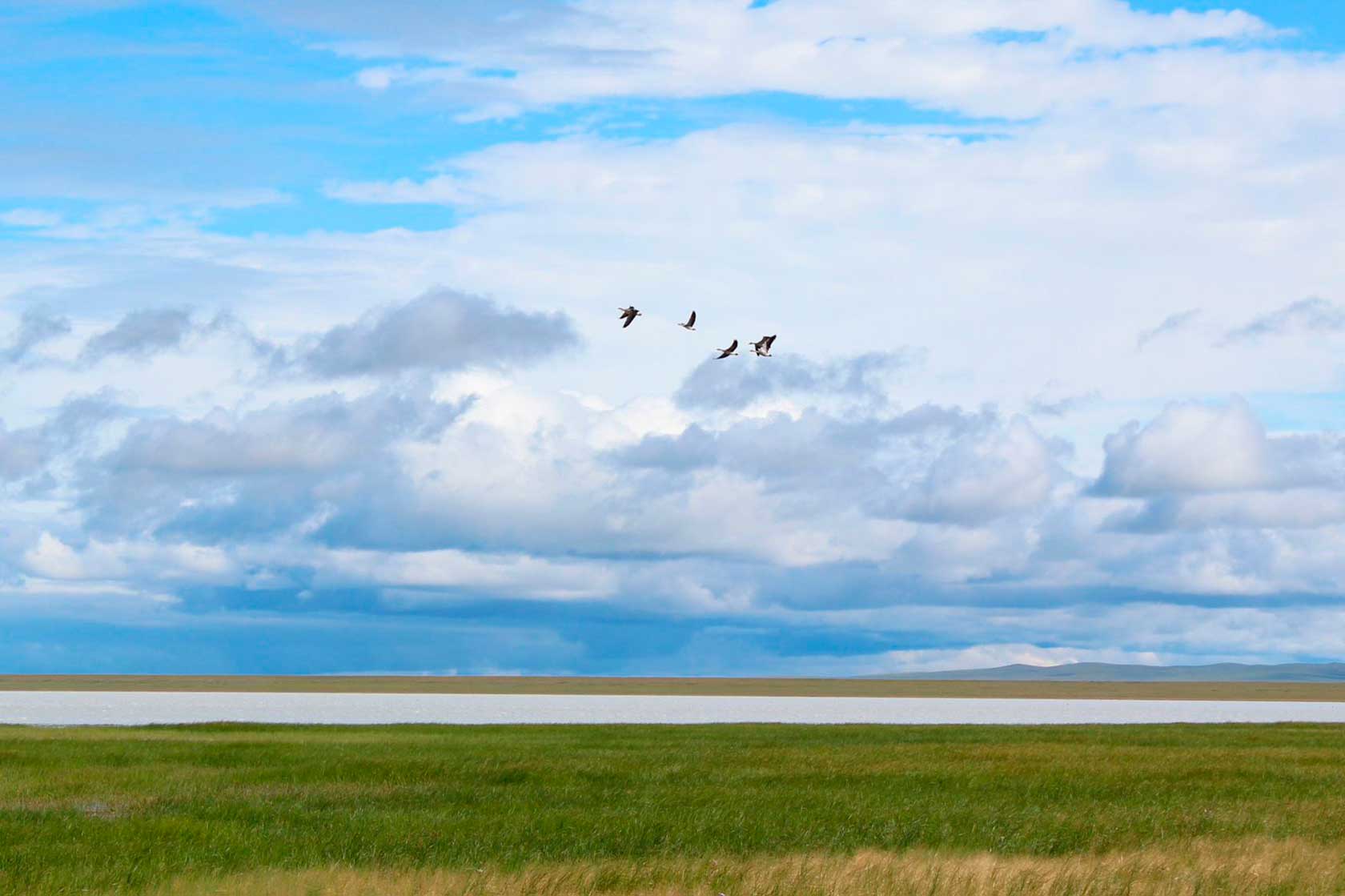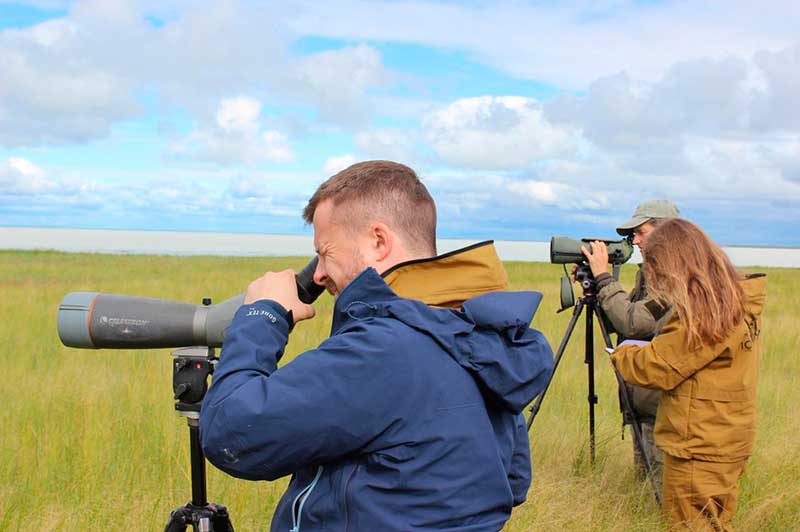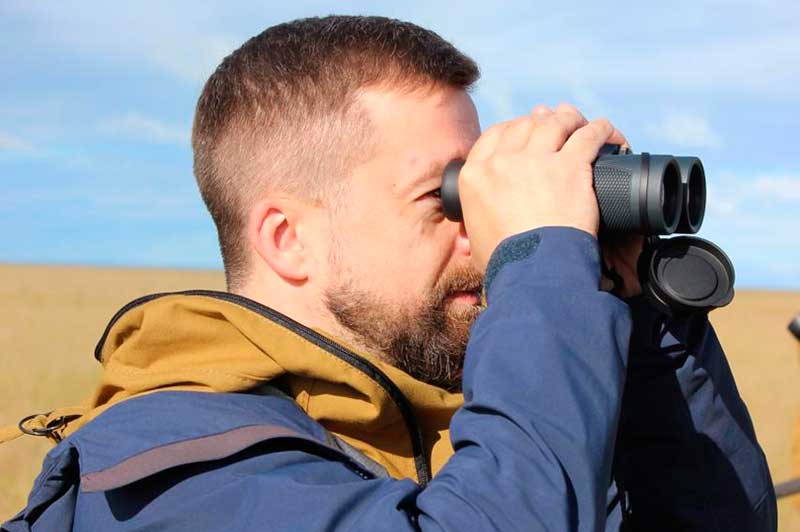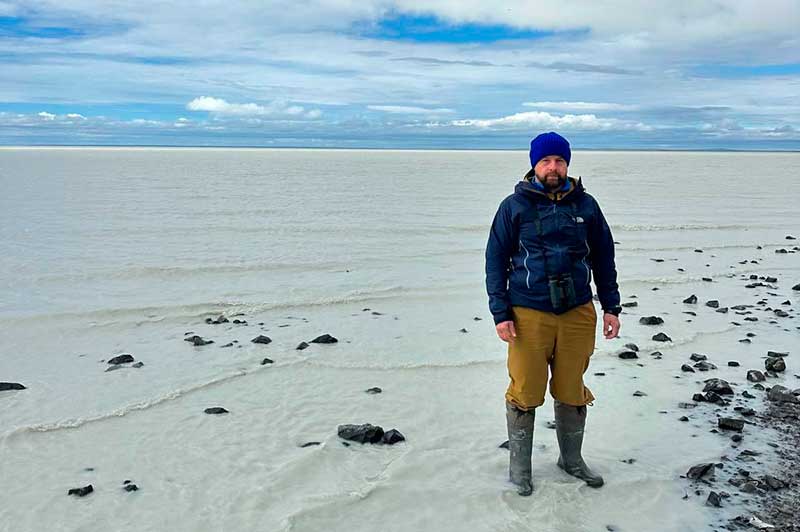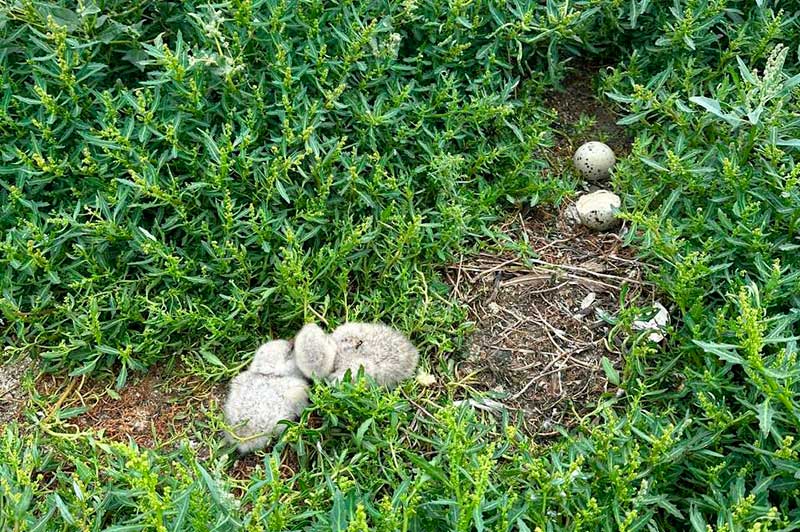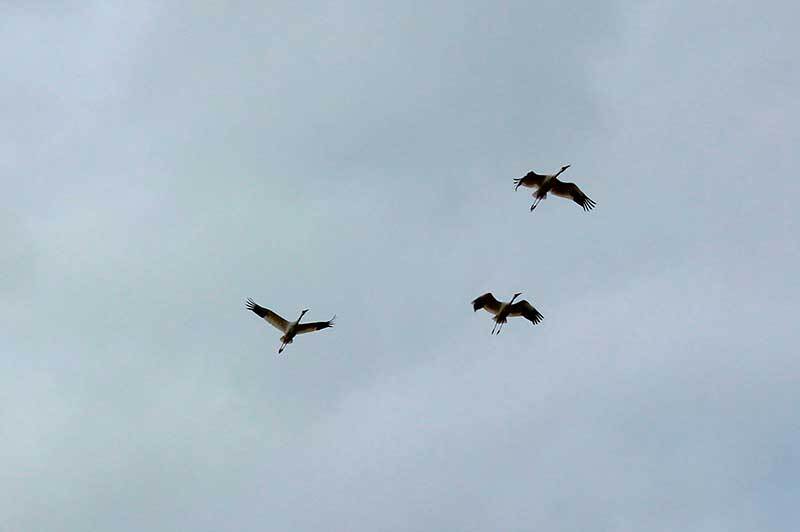Sergei Bulkin, an employee of Nornickel Moscow, is a regular on the Poneslos eco-marathon. In 2025, he decided to try scientific volunteering and headed to the ends of the earth – the Daurian Nature Reserve in the Trans-Baikal Territory.
Three days of full-immersion work with binoculars and constant note taking helped the reserve's research scientists collect valuable data, while Sergei got to observe the stunning nature and get unique insights about birds.
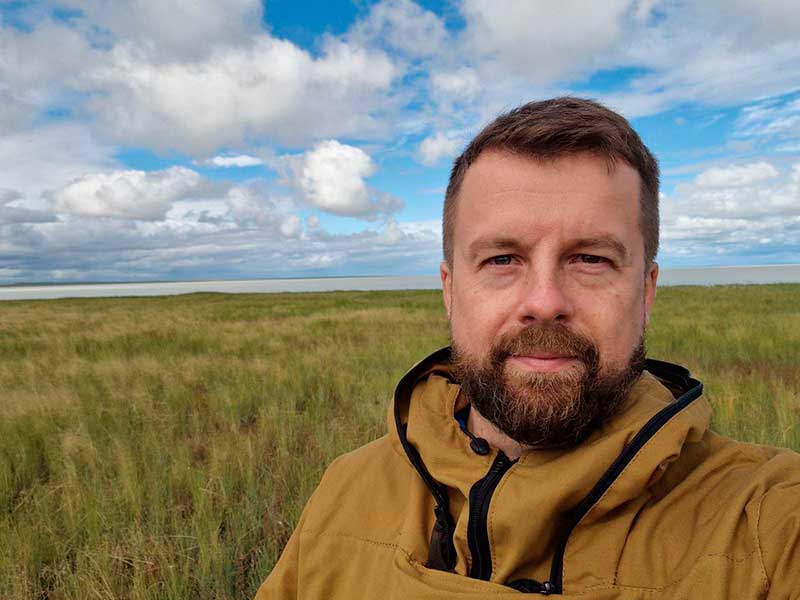
– How long have you been a volunteer?
– I've been doing the Poneslos eco-marathon for ten years now, since its start. I had just joined Nornickel back then but saw the company's strong capability in managing the volunteer movement right away. Since then, volunteering turned into a way of life. I love spending my free time on giving back to nature and community and changing life around me for the better.
Our volunteer team, Banda-Panda, led by ardent enthusiast Nadezhda Krylova, engages in numerous initiatives like natural landscape improvement, assistance to several writers' homes in Peredelkino, and dog walking for shelters. I try and participate in all events of the Poneslos eco-marathon.
– Why did you decide to join the scientific volunteering program this year?
– I felt like exploring my own potential and see if I could prove useful to the reserve. They did warn me that the Trans-Baikal Territory was not easy to fly to and that living conditions during the expedition are not even close to vacation. But I have a solid experience in hiking with tents, so it did not scare me off. I applied, got accepted and took a three-day leave from work. Two people from the Bystrinsky GOK and a coordinator from the Protected Area Embassy (Zapovednoe Posolstvo) foundation also took part in the expedition.
– What nature reserve did you work in and what were your responsibilities?
– We worked in the Daurian Nature Reserve, on the China–Mongolia border. The nature here is spectacular: boundless steppe, mountain silhouettes on the horizon, and vibrant early fall colors. We were led by deputy director and head of the Science Department, Oleg Goroshko, a scientist, wonderful storyteller, and a very interesting person. Meeting him has made a lasting impression on me. It was him who taught me lots about Dauria and I realized that all the people working in the reserve are deeply passionate and devoted to their cause. Working in difficult conditions and for little remuneration is about commitment.
– I've been doing the Poneslos eco-marathon for ten years now, since its start. I had just joined Nornickel back then but saw the company's strong capability in managing the volunteer movement right away. Since then, volunteering turned into a way of life. I love spending my free time on giving back to nature and community and changing life around me for the better.
Our volunteer team, Banda-Panda, led by ardent enthusiast Nadezhda Krylova, engages in numerous initiatives like natural landscape improvement, assistance to several writers' homes in Peredelkino, and dog walking for shelters. I try and participate in all events of the Poneslos eco-marathon.
– Why did you decide to join the scientific volunteering program this year?
– I felt like exploring my own potential and see if I could prove useful to the reserve. They did warn me that the Trans-Baikal Territory was not easy to fly to and that living conditions during the expedition are not even close to vacation. But I have a solid experience in hiking with tents, so it did not scare me off. I applied, got accepted and took a three-day leave from work. Two people from the Bystrinsky GOK and a coordinator from the Protected Area Embassy (Zapovednoe Posolstvo) foundation also took part in the expedition.
– What nature reserve did you work in and what were your responsibilities?
– We worked in the Daurian Nature Reserve, on the China–Mongolia border. The nature here is spectacular: boundless steppe, mountain silhouettes on the horizon, and vibrant early fall colors. We were led by deputy director and head of the Science Department, Oleg Goroshko, a scientist, wonderful storyteller, and a very interesting person. Meeting him has made a lasting impression on me. It was him who taught me lots about Dauria and I realized that all the people working in the reserve are deeply passionate and devoted to their cause. Working in difficult conditions and for little remuneration is about commitment.
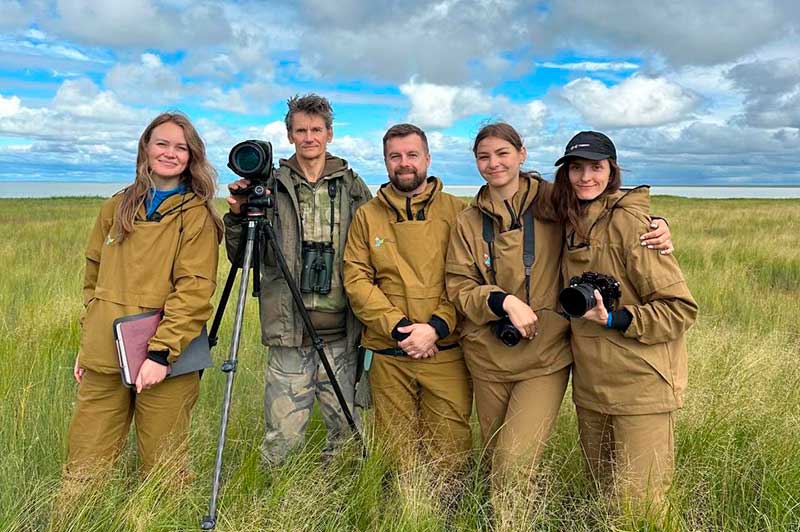
We lived at the Utochi Cordon site, 80 km from the reserve’s administrative headquarters. The expedition was tasked with a waterfowl count on two Daurian lakes, Barun-Torey and Zun-Torey. It is a pulsating ecosystem. Over a 25-35-year cycle, the lake can dry out to get very shallow and then refill to the size of Russia's three largest lakes.
Reserve staff are monitoring the effects of this expansion and contraction on the population of birds that settle here in massive colonies. Their multiple mound-like nests resemble a megacity. This place is home to many species of waterfowl, including the Siberian crane, listed in Russia's Red Data Book.
Every morning, we used to drive to the now shallow lakes on all-terrain vehicles or swamp buggies to watch the birds. They gave us printed guides, so we learned to identify species from their descriptions, count each single bird, and record the data in a journal.
We also gathered feathers for the lab to assess them for mercury contamination. This work is done under an international program. We prepared biomaterials for dietary analysis of certain species. It is important for researchers to understand how dietary composition changes depending on the lake cycle.
Reserve staff are monitoring the effects of this expansion and contraction on the population of birds that settle here in massive colonies. Their multiple mound-like nests resemble a megacity. This place is home to many species of waterfowl, including the Siberian crane, listed in Russia's Red Data Book.
Every morning, we used to drive to the now shallow lakes on all-terrain vehicles or swamp buggies to watch the birds. They gave us printed guides, so we learned to identify species from their descriptions, count each single bird, and record the data in a journal.
We also gathered feathers for the lab to assess them for mercury contamination. This work is done under an international program. We prepared biomaterials for dietary analysis of certain species. It is important for researchers to understand how dietary composition changes depending on the lake cycle.
– What is your most memorable experience in this expedition?
– Bird watching, for sure. I've found out so much about them, learned to distinguish herons from cranes, both perched and flying. I got to see the birds which I never even knew existed! My dream, though, was to see the bustards, the largest flying birds, but that didn't happen. Next time, then. But we did get to see two dzerens. They usually migrate in large herds, but these two were walking separately and let us approach them for a closer look.
After I came back, I shared the beautiful natural landscapes on social media and basically introduced the Daurian Nature Reserve to many of my friends. Some of them are seriously considering visiting the reserve. So, I kind of got to promote the ecotourism.
– Bird watching, for sure. I've found out so much about them, learned to distinguish herons from cranes, both perched and flying. I got to see the birds which I never even knew existed! My dream, though, was to see the bustards, the largest flying birds, but that didn't happen. Next time, then. But we did get to see two dzerens. They usually migrate in large herds, but these two were walking separately and let us approach them for a closer look.
After I came back, I shared the beautiful natural landscapes on social media and basically introduced the Daurian Nature Reserve to many of my friends. Some of them are seriously considering visiting the reserve. So, I kind of got to promote the ecotourism.
– Do you think your input was helpful to the scientists and the reserve?
– Honestly, as I was flying to join the expedition I had concerns whether I'd be of any help. The program was very short: what can be done in three days and with no special education? But my skepticism soon faded. Together with the reserve staff, we successfully completed many tasks. Oleg Goroshko usually works with one lab assistant, but in this project he had three times as many helpers. We were able to cover more ground and collect more samples.
Even our inexperience was appropriate: with a fresh pair of eyes, we found curious samples. But most importantly, our team worked with great enthusiasm. Even the scientist admitted that he did not expect such an effect. He actually thought that we would come to 'just look around'. Instead, we girded ourselves for the challenge and kept asking for more work.
– Do you think that scientific volunteering is a viable area of action?
– Yes, if we're speaking about Nornickel's volunteers. There are no 'accidental' people on our programs. Only those willing to work and eager to learn. And that's exactly what our team was: motivated, with a spark in our eyes and never a 'no' to a task. Remember the famous movie? "Sand pit... - Me! – Cement plant… – Me!" And our eagerness to work was much appreciated by the scientific staff.
Our nights were even more exciting! We argued about various biological concepts, discussed interesting natural phenomena, such as butterflies migrating across the ocean, i.e. we've learned from each other's experiences.
The success of a volunteer program depends on the people participating in it. There are bad examples, of course, when volunteers set their own rules and refuse to do what is required. So, it's not always a ready-made solution for the nature reserve. Meanwhile, the organization of volunteering in Nornickel yields helpful benefits. The reserve staff themselves told us so and invited us to come again.
– After you returned from the expedition, do you have a feeling that life around you or you yourself have changed?
– I have most definitely broadened my horizons and made new friends in the Bystrinsky GOK and Zapovednoe Posolstvo foundation. We have a group chat where we share interesting facts about nature. It turns out that Moscow runs a duck census program, and I took a photo of a curious bird right on a pond in the city. People began to send me links to popular science lectures on biology and I have attended one already. Basically, I got a new area of interest.
– What would you say to a co-worker who is only thinking about becoming a scientific volunteer? What would be best: to prepare mentally or physically?
– First and foremost, my advice would be not to fear that biology is not your field of knowledge. You will get the guidance and support to make a valuable contribution. Secondly, manage your expectations to avoid disappointment. You will find yourself in rather simple and severe conditions and it's better to be prepared. The cell signal will most likely be unstable. We connected to a cellular network only on day two, and it was Mongolian. Most probably, you won't be able to enjoy social networking as usual.
Check the weather in advance to pack proper clothing and equipment. If you don't have any specific items, such as an anti-encephalitis suit or even a backpack, the company will provide them for you. Your meals and plane tickets will also be paid for. I keep saying that Nornickel champions social responsibility towards its employees, including those enthusiasts who participate in corporate volunteer programs.
– Honestly, as I was flying to join the expedition I had concerns whether I'd be of any help. The program was very short: what can be done in three days and with no special education? But my skepticism soon faded. Together with the reserve staff, we successfully completed many tasks. Oleg Goroshko usually works with one lab assistant, but in this project he had three times as many helpers. We were able to cover more ground and collect more samples.
Even our inexperience was appropriate: with a fresh pair of eyes, we found curious samples. But most importantly, our team worked with great enthusiasm. Even the scientist admitted that he did not expect such an effect. He actually thought that we would come to 'just look around'. Instead, we girded ourselves for the challenge and kept asking for more work.
– Do you think that scientific volunteering is a viable area of action?
– Yes, if we're speaking about Nornickel's volunteers. There are no 'accidental' people on our programs. Only those willing to work and eager to learn. And that's exactly what our team was: motivated, with a spark in our eyes and never a 'no' to a task. Remember the famous movie? "Sand pit... - Me! – Cement plant… – Me!" And our eagerness to work was much appreciated by the scientific staff.
Our nights were even more exciting! We argued about various biological concepts, discussed interesting natural phenomena, such as butterflies migrating across the ocean, i.e. we've learned from each other's experiences.
The success of a volunteer program depends on the people participating in it. There are bad examples, of course, when volunteers set their own rules and refuse to do what is required. So, it's not always a ready-made solution for the nature reserve. Meanwhile, the organization of volunteering in Nornickel yields helpful benefits. The reserve staff themselves told us so and invited us to come again.
– After you returned from the expedition, do you have a feeling that life around you or you yourself have changed?
– I have most definitely broadened my horizons and made new friends in the Bystrinsky GOK and Zapovednoe Posolstvo foundation. We have a group chat where we share interesting facts about nature. It turns out that Moscow runs a duck census program, and I took a photo of a curious bird right on a pond in the city. People began to send me links to popular science lectures on biology and I have attended one already. Basically, I got a new area of interest.
– What would you say to a co-worker who is only thinking about becoming a scientific volunteer? What would be best: to prepare mentally or physically?
– First and foremost, my advice would be not to fear that biology is not your field of knowledge. You will get the guidance and support to make a valuable contribution. Secondly, manage your expectations to avoid disappointment. You will find yourself in rather simple and severe conditions and it's better to be prepared. The cell signal will most likely be unstable. We connected to a cellular network only on day two, and it was Mongolian. Most probably, you won't be able to enjoy social networking as usual.
Check the weather in advance to pack proper clothing and equipment. If you don't have any specific items, such as an anti-encephalitis suit or even a backpack, the company will provide them for you. Your meals and plane tickets will also be paid for. I keep saying that Nornickel champions social responsibility towards its employees, including those enthusiasts who participate in corporate volunteer programs.
Photos by Nornickel
October, 2025
October, 2025






